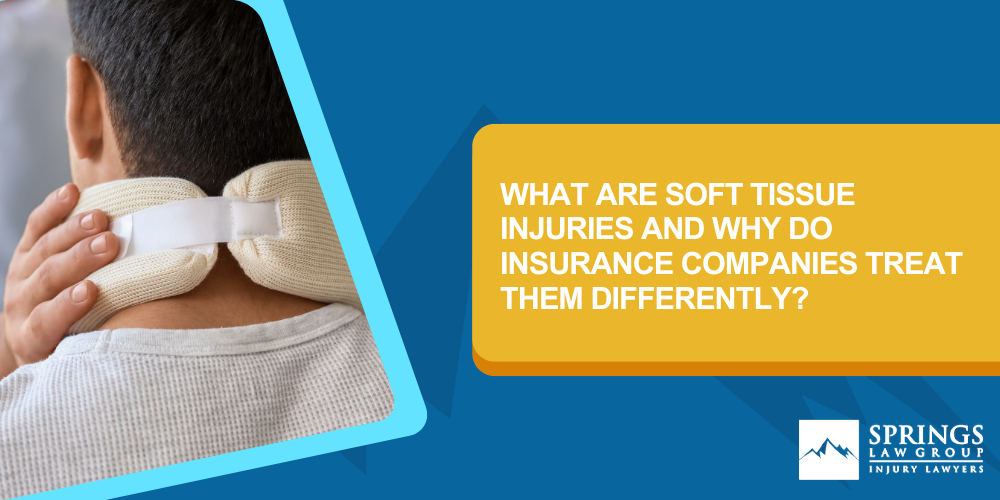What are Soft Tissue Injuries and Why Do Insurance Companies Treat Them Differently?

If you have ever tried to get an insurance company to pay for injuries you sustained in a car wreck or slip-and-fall, you have probably heard the phrase “soft tissue injuries.” In fact, it is often used to minimize or downplay the severity of your injuries. But what are soft tissue injuries and why do insurance companies treat them differently than other types of injuries?
Your “soft tissues” are your muscles, ligaments, and tendons. These tissues work together to stabilize your body and enable movement of joints, such as the connections between the head and the neck.
Soft tissue injuries can be very painful and persistent and difficult to heal. Even so, most soft tissue injuries cannot be seen and are less “dramatic” than other types of injuries, such as broken bones.
The common types of soft-tissue injuries are sprains, strains, tendonitis, bursitis, and contusions.
Sprain: A sprain is an injury to a ligament, often caused by forces that wrench or twist the ligament. Ligaments are elastic tissues that connect bones to other bones. Sprains occur when forces cause the ligaments to stretch beyond their ordinary range of motion. Whiplash—where your head goes suddenly forward then suddenly backward—is a common cause of neck sprains and strains.
Strain: Where a sprain is injury to a ligament, a strain is an injury to a muscle or tendon. Strains are often caused by overuse, force, or stretching. Strains can be caused by poor posture, such as how you’re sitting when you’re reading this blog article. As noted above, a common cause of neck strains in car accidents is whiplash.
Tendonitis: Tendonitis occurs when there is inflammation of a tendon. Tendons are flexible tissues that connect your muscles to your bones. Tendonitis often occurs when an area of the body is overused due to repetitive motions, which is why athletes are susceptible to injuries like tennis or golfer’s elbow, swimmer’s shoulder, and jumper’s knee. However, it can be caused by car accidents where the forces on the tendon are sudden and direct.
Bursitis: Like tendonitis, bursitis results from inflammation. Unlike tendonitis, the inflammation of bursitis occurs in the bursa, which is a sac of fluid that cushions bones, muscles, and tendons. Common areas of bursitis are the joints at shoulder, elbow, knee, hip, ankle, and foot. Trauma or overuse can cause bursitis. A car accident could cause bursitis if the bursa sustains damage through a sudden force, leading to damage and inflammation, like striking your knee or absorbing impact in your shoulder.
Contusion: Contusions are bruises. They are usually caused by a blunt force, like something hitting you or a fall, causing pain, swelling, and discoloration due to bleeding in the affected tissue affected.
Because soft tissue injuries are less dramatic and usually more difficult to see, it is easier to dismiss their severity or to disbelieve the injury victim’s perception of pain arising from the soft tissue injury. They can also be more difficult to diagnose or to catch on an x-ray or MRI. Over time, as your body ages, the ligaments and tendons naturally wear down or are damaged by misuse or overuse, which makes later injury difficult to distinguish from ordinary aging factors. These are some of the reasons that insurance companies will fight harder not to pay for soft tissue injuries.
However, an experienced personal injury attorney can push back. Soft tissue injuries are very common in car accidents, often caused by whiplash, and can have lasting effects, even permanent injury and impairment. To dismiss them just because they’re difficult to prove would be highly unfair to the injury victim. An experienced personal injury attorney can work with your treatment providers to demonstrate the severity of your injuries and to get the compensation you need to recover from your accident.
The experienced attorneys at Springs Law Group offer free consultations. We would be happy to discuss with you the effect of your soft tissue injuries on your claim and how to deal with the insurance company’s arguments that your injuries are minimal. Give us a call today!
